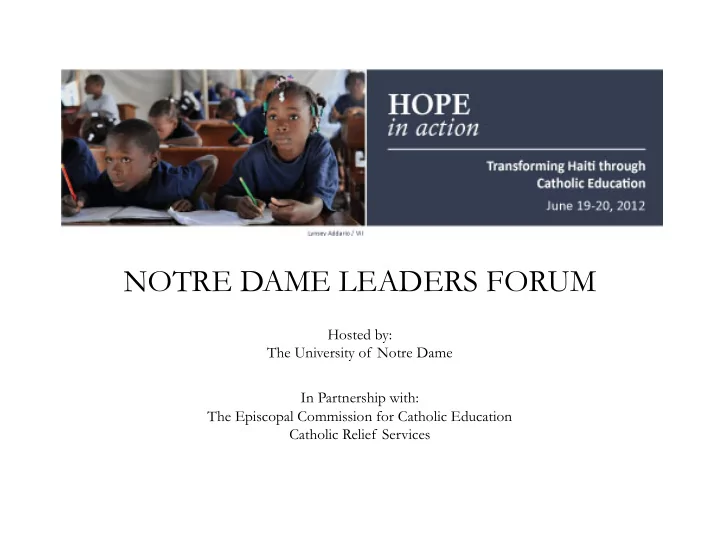

NOTRE DAME LEADERS FORUM Hosted by: The University of Notre Dame In Partnership with: The Episcopal Commission for Catholic Education Catholic Relief Services
Haitian Catholic Education Renewal: National Assessment and Strategic Planning Episcopal Commission for Catholic Education Catholic Relief Services University of Notre Dame’s ACE Consulting
Project Team Episcopal Commission for ACE Consulting, University Catholic Education of Notre Dame • • Delille Antoine Steve Perla • • Eddy Etienne TJ D’Agostino • • Fr. Jean Julien Ladouceur Sr. Kathleen Carr • • Pierre Péralt Tessono Brandy Ellison • Shannon Stackhouse Flores • Catholic Relief Services John Waller • Luke King • Rachel Hermes Schools for the Children of the World • Bill DeJong • Matt DeJong • Chuck Newman
A unique moment for Catholic Education Why this project? • 2010 earthquake • Need for a “one Church response” • A priority for Church leaders • A priority for Government leaders • Systemic, long-term vision • Powerful alliance
National Assessment and Planning • National Assessment – Leadership interviews – Diocesan surveys – National survey of 2,315 Catholic schools • iPod touches, GPS mapping, mobilized church structures – Post-Earthquake Facilities Assessment • 220 schools in three earthquake affected (arch)dioceses
National Assessment and Planning ¡ • Implementation Planning – Stakeholder meetings – Existing plans • Catholic Education Project, 2007 • CEEC Action Plan (2010) • Operational Plan (MENFP) – Assessment and national survey results
GPS Mapping of Catholic Schools 1-2 key facts about GPS process or benefits • Current location information • General information at fingertips
Overview of Catholic Schools • 2,315 Catholic schools surveyed – 2,037 fundamental schools (92%) – 363 secondary schools (17%) • 602,149 students • 27,565 teachers
Overview of Catholic Schools
Findings and Projects • Governance – 30% of schools have participatory structures (i.e. school boards) – PEC pilot of 2011 – Project: scale participatory structures nationally • BDE Strengthening through Planning and Revenue – Asset of Catholic education – 10 diocesan offices – Insufficient capacity in many – Central to systemic improvements – Project: micro-ventures in partnership with FONKOZE – Project: planning and data utilization support
Findings and Projects • Teacher Training – 70-80% of teachers in Haiti lack training (Rand 2010) – Top priority of Catholic education leaders (ACE Consulting 2012) – Central to improving quality – Project: Primary and Secondary School Teacher Training • Building sustainable capacity among Haitian institutions • Leveraging Technology • Working with MENFP towards certification
Findings and Projects • Technology – Potential for leap-frog effect, but major barriers – Less than half of school have access to electricity – 7% of schools with internet access – 20% of schools with computer access – Project: Task Force for utilization of technology in Catholic schools and modernizing diocesan offices to empower the national network.
Other Major Findings • Facilities – 3 out of 4 schools assessed have major or severe infrastructure needs and half need to be completely rebuilt. • Access – Government relations and increased subsidies (currently 11%) – Strategies to improve retention • Accreditation – 35% of Catholic schools accredited, comparably high – CEEC to serve as 3 rd party accreditation agency to support the Government with quality control and regulation • Catholic Identity – 19% of schools not preparing for Sacraments – 14% of schools not providing Catechesis
Catholic School Enrollment 140,000 ¡ Student ¡Enrollment ¡ 120,000 ¡ 100,000 ¡ 80,000 ¡ 60,000 ¡ 40,000 ¡ Total ¡Number ¡Students ¡ 20,000 ¡ Number ¡of ¡Boys ¡ 0 ¡ Number ¡of ¡Girls ¡
Impact for Haitian Catholic Education Catholic Education Project of Haiti • Building a person who lives his faith in the Church and society; a person more human, more just, more caring and more fraternal. • Building a person that renews their knowledge and expertise to solve problems in the world. • Developing a person who is free and self-sufficient, a new type of citizen, productive for herself and society.
Impact for Haitian Catholic Education Catholic Education Project of Haiti • Shaping a person who respects the sanctity of the human being, human rights, moral values and who practices the "good life together.” • Nurturing a person who claims his personal and national identity, open to other cultures while cultivating his own • A person who respects life in all its forms and works to protect and renew the environment, which is so needed in Haiti.
Recommend
More recommend